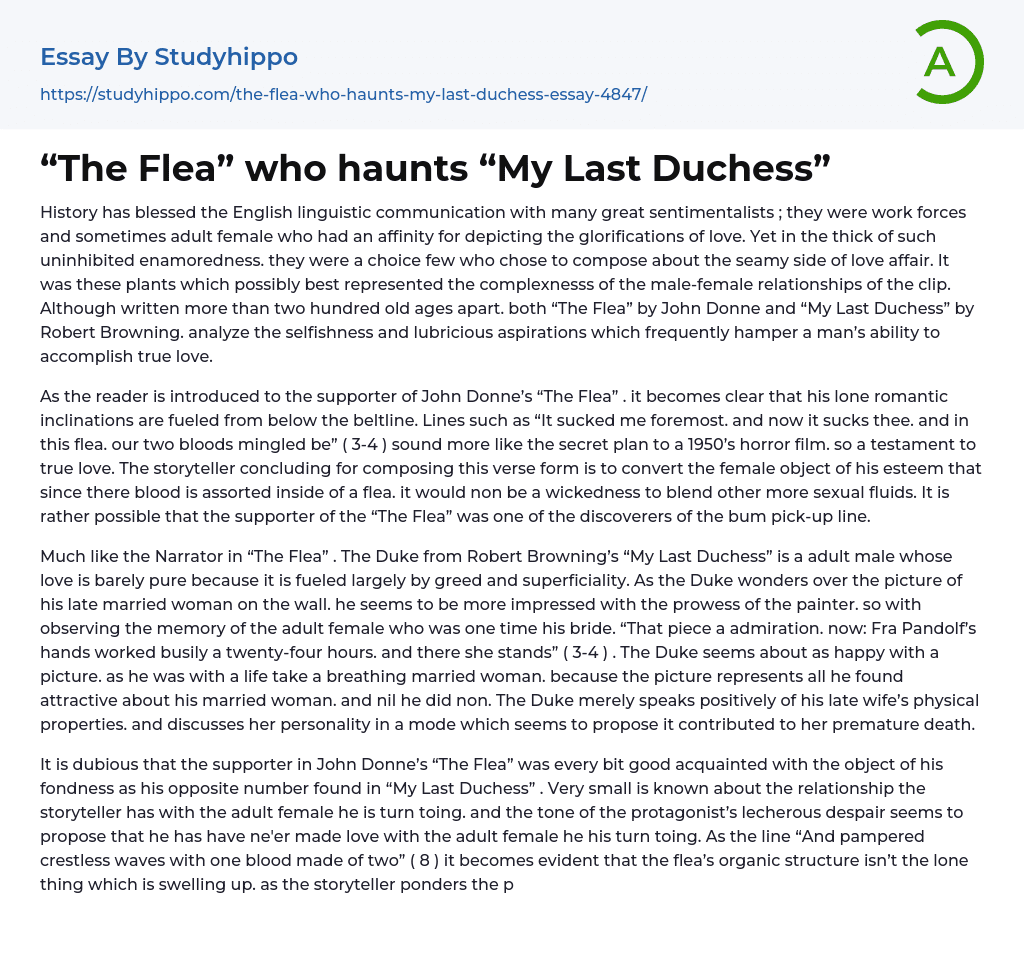History has blessed the English language with numerous great romantics, both men and occasionally women, who possessed a talent for depicting the wonders of love. However, amongst these passionate souls, there were a select few who chose to explore the darker side of romance. These works, perhaps, best represented the complexities of relationships between men and women during that time period. Despite being written more than two hundred years apart, both John Donne's "The Flea" and Robert Browning's "My Last Duchess" delve into the selfish and lustful desires that often hinder a man's ability to attain true love.
In Donne's "The Flea," the protagonist's romantic inclinations are clearly driven by base desires. Phrases such as "It sucked me first, and now it sucks thee, and in this flea our two bloods mingle
...d be" (3-4) resemble a plot more fitting for a 1950s horror movie than a testament to true love. The narrator's motivation for writing this poem is to persuade the female subject of his admiration that since their blood is already mixed inside a flea, it would not be sinful to mix other, more intimate fluids. It is quite possible that the protagonist of "The Flea" was one of the inventors of the cheesy pick-up line. Similarly to the narrator in "The Flea,"In Robert Browning’s “My Last Duchess,” the Duke is described as an adult male whose love for his late wife is not genuine, but driven by greed and superficiality. He admires a painting of her and is more impressed with the skill of the painter, rather than the memory of his deceased bride. He only speaks positively about his wife's physical appearance and
suggests that her personality may have contributed to her early death. Comparatively, the protagonist in John Donne's "The Flea" appears to have less familiarity with his beloved. The nature of their relationship is unclear, but the speaker's desperate and lustful tone suggests that they may have never been intimate. The line "And pampered crestless waves with one blood made of two" indicates that not only the flea's body, but also the speaker's desires are increasing.The storyteller contemplates the merging of bodily fluids, while the supporter indulges in stereotypical female romantic fantasies of a perfect marriage. The topic of matrimony is seamlessly integrated into his hormonal-induced rant. Using the metaphor of a flea, the supporter likens their union to a bed and temple of matrimony. The execution of this forced imagination mirrors the skill of a dog dancing on all fours. In "My Last Duchess," it becomes clear that extramarital affairs were more perilous than mere sexual solicitation. The image of his wife reminds the Duke of her less commendable qualities, causing him distress over her interactions with other men. This jealousy ultimately leads to her premature death. The Duke's desire is to possess something that no other man has had. The phrase "How shall I say?" implies an attempt to find less suspicious words in describing his emotions.The storyteller in John Donne's poem "The Flea" compares the harm caused by sexual satisfaction to that of a flea bite. He takes a similar approach to courting as the snake in the Garden of Eden, downplaying the significance of sex and making it seem like a minor annoyance. The narrator never speaks of lovemaking in an enjoyable
way, highlighting his selfishness and lack of regard for the woman he is addressing. In a soliloquy, the Duke expresses his disgust for his late wife's lack of respect for him. He then transitions to discussing his upcoming second marriage, making for a disconnected change of topic.The text suggests that something significant occurred after the Duchess stopped smiling for her husband, which the Duke refuses to discuss, indicating that it was likely her murder. This is an advantage that the Duke possesses over the narrator of "The Flea" as he knows when to keep silent. When considering both "The Flea" and "My Last Duchess" in a broader context, the two male protagonists portray their gender in a negative light. These poems are most effective when contrasted with a wider range of writings from their respective time periods, which feature both admirable and unsightly examples of male individuals.
- Adoption essays
- Aunt essays
- Babies essays
- Bedroom essays
- Caring essays
- Children essays
- Daughter essays
- Divorce essays
- Dog essays
- Dysfunctional Family essays
- Family Tradition essays
- Family Values essays
- Father essays
- Foster Care essays
- Friends essays
- Grandparent essays
- Home essays
- Hometown essays
- Husband essays
- Jealousy essays
- Love essays
- Marriage essays
- Mother essays
- Online Dating essays
- Parenting essays
- Parenting Teens essays
- Parents essays
- Relationship essays
- Room essays
- Sibling essays
- Sister essays
- Wedding essays
- Wife essays
- Aeneid essays
- Beowulf essays
- Blackberry Picking essays
- Canterbury Tales essays
- Dulce Et Decorum Est essays
- My Last Duchess essays
- Odyssey essays
- Sir Gawain And The Green Knight essays
- The Road essays




